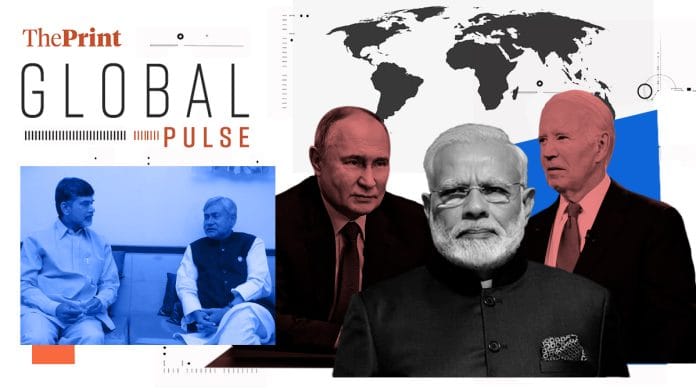New Delhi: Russia continues to wield significant influence in the Indo-Pacific despite its focus on other regions, Derek Grossman, a senior defence analyst at the Rand Corp, writes in Foreign Policy.
Grossman’s report, ‘Russia is a strategic spoiler in the Indo-Pacific‘, says that Russian President Vladimir Putin visited China, North Korea, and Vietnam to shore up strategic partnerships between mid-May and mid-June. “Russia’s influence in the Indo-Pacific is much smaller than that of China and the United States,” Grossman points out, highlighting it is still capable of promoting its “anti-Western interests” and disrupting “the already precarious regional order”.
Russia, writes Grossman, aims to counter US hegemony and bolster its global position. The Kremlin “can leverage the Indo-Pacific as a useful distraction” and block the attempts by Washington and its partners to ensure that “Ukraine hands Russia a defeat”, he adds.
Prime Minister Narendra Modi wrapping the Russian President in a hug indicates that besides the US President, he has another “dear friend”, correspondents Gerry Shih, Mary Ilyushina and Catherine Belton write in a report in The Washington Post.
Their report, ‘Modi bear-hugs Putin in Moscow, marking deep ties between Russia and India‘, highlights the enduring ties between the two countries despite Western attempts to isolate Russia following the Ukraine war. New Delhi, amid the increased Indian imports of Russian oil, seeks to balance its relationships with Moscow and Washington and maintain autonomy in its foreign policy, adds the report.
The report notes that speaking about the development, US State Department spokesman Matthew Miller has said, “We have made quite clear directly with India our concerns about their relationship with Russia”, while Ukrainian President Volodymyr Zelensky has called the Modi-Putin meeting “a huge disappointment and a devastating blow to peace efforts”. However, Modi has called for “dialogue” to end the fighting in Ukraine at a meeting with Putin, who, in turn, has appreciated Modi’s efforts in “trying to find some ways to resolve the Ukrainian crisis”.
In ‘Families of Indians duped into Russia’s war hope Modi will bring them home‘, Al Jazeera’s Yashraj Sharma reports on the Indian families stuck in a “limbo”, with their men duped into fighting for Russia on the front lines in Ukraine on the promise of better jobs. Modi’s Moscow visit looks to secure the return of nearly 50 such individuals.
“He never wanted to do this. This is not our war….I fear for his safe return,” the wife of one of these men tells Al Jazeera. The issue was initially raised by Hyderabad MP Asaduddin Owaisi after several families from his constituency contacted him for help, says the report, adding that there are similar recruits from Nepal, Sri Lanka, and China.
“Indian policymakers and market participants are riding a wild horse that won’t allow them to dismount in time,” columnist Karan Mehrishi writes in his opinion piece in Nikkei Asia — ‘Warning signs are flashing over India’s financial excesses‘.
Citing former World Bank economist Carmen Reinhart, Mehrishi writes that asset prices fueled by accommodative fiscal and monetary policy become a source of regret when a recession hits, but, despite that, policymakers continue to consider boom-bust cycles in isolation. The Modi-led government plans to reduce personal taxes to spur consumption despite financial stress in households and record levels of growth in personal loans, he writes, warning of “a recipe for disaster”. The loans, he writes, have been routed into the ever-growing mutual funds, allowing India’s market capitalisation to climb, creating a “bubble”.
Mehrishi warns that proposed foreign capital inflows will exacerbate liquidity conditions, which, along with the high interest rates of loans, will make households “the real losers” as banks protect themselves. With Indian corporations unsure about expanding, fewer jobs that allow households to take and repay loans may be available and then growth rates will plummet, Mehrishi writes, calling for policy interventions to avoid a future “moral hazard” for the government.
Modi’s second-biggest ally, the Nitish Kumar-led Janata Dal (United), asking for Rs 300 billion from the federal budget for Bihar underscores the fiscal pressures facing the coalition government, correspondent Ruchi Bhatia writes in a Bloomberg report. The biggest ally, Chandrababu Naidu, has already made similar demands for Andhra Pradesh.
“The combined fiscal demands from the two coalition parties are equivalent to more than half of the government’s annual food subsidy budget,” Bhatia writes. Both the states, she adds, are under financial strain and finding it difficult to invest in development projects.
Biden hosts NATO members, UN reports on Afghanistan
Biden is hosting NATO members to mark the alliance’s 75th anniversary. The war in Ukraine and the threats from the rise of China will be key areas of the talks. To know more, read The New York Times report.
A UN report on Afghanistan published Tuesday suggested that the Taliban’s morality police squads have created a “climate of fear”, especially among women. To know more, read the DW’s report.
(Edited by Madhurita Goswami)
Also read: Modi-Putin meeting defies Western pressure & what drives the popularity of godmen in India






